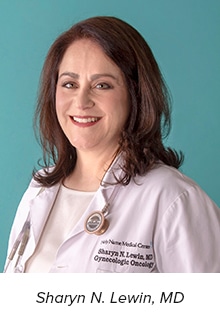Treating Challenging Cancers with HIPEC

Survival times have lengthened for patients with certain challenging cancers thanks to a leading-edge “hot chemotherapy” treatment available at the Patricia Lynch Cancer Center at Holy Name.
Hyperthermic intraperitoneal chemotherapy (HIPEC) is used for some cancers that have spread to the abdomen, including mesothelioma or ovarian, colorectal, gastric (stomach), and appendix cancers. These can be aggressive cancers, and we want to do everything we can to help patients achieve longer survival.
HIPEC involves bathing the abdominal cavity with chemotherapy drugs – heated to about 106 degrees – right after surgery to remove tumors in the abdominal cavity. While the patient is still in the operating room, the chemo bath follows and may last up to 90 minutes.
The heated chemotherapy can deliver concentrated dosing to the abdominal cavity to kill microscopic cells (cells that are nonvisible to the naked eye) after the initial operation to remove macroscopic (or visible) tumors. The procedure improves drug absorption because the warmth overcomes the resistance of some cells to chemotherapy. It also minimizes the effect of chemotherapy to the rest of the body, mitigating the side effects of systemic intravenous chemotherapy treatment as the drug does not travel through the blood stream.
A Promising Treatment
HIPEC is an important treatment option for ovarian and appendiceal cancers that have metastasized within the abdominal cavity, as well as mesothelioma and primary peritoneal cancers (cancers of the abdominal lining that covers the organs of the abdomen).
With mounting evidence of its effectiveness, HIPEC increasingly is also being used for other gastrointestinal cancers and colorectal cancers that have spread to the abdominal cavity as well. Some studies have shown that HIPEC may help improve survival for advanced colorectal cancers from six months to up to 36 months, and the treatment improves life expectancy for those with metastatic gastric cancers by nearly two years.
HIPEC holds great promise in lengthening the life of patients with hard-to-treat cancers. We’re pleased to offer it at Holy Name, where we strive to have the most cutting-edge treatments available to our patients.
Sharyn N. Lewin, a board-certified gynecologic oncologist, is the Medical Director of the Division of Gynecologic Oncology at Holy Name Medical Center and specializes in the diagnosis, treatment and management of ovarian, endometrial, uterine, cervical, vulvar and vaginal cancers. She is participating in clinical trials for a number of new therapies and treatment protocols.
Dr. Steve Sung Kwon is a board-certified surgical oncologist and researcher. He specializes in the management of primary and secondary liver cancer, as well as cancers of the gallbladder, bile duct, stomach, intestines, colon, rectum, and thyroid. He is engaged in clinical research to investigate the use of quality improvement for surgical patients.
For more information or to make an appointment, call the Patricia Lynch Cancer Center at 201-541-5900. Both Dr. Lewin and Dr. Kwon provide in-person and telemedicine appointments: HolyNameMedicalPartners.org.

